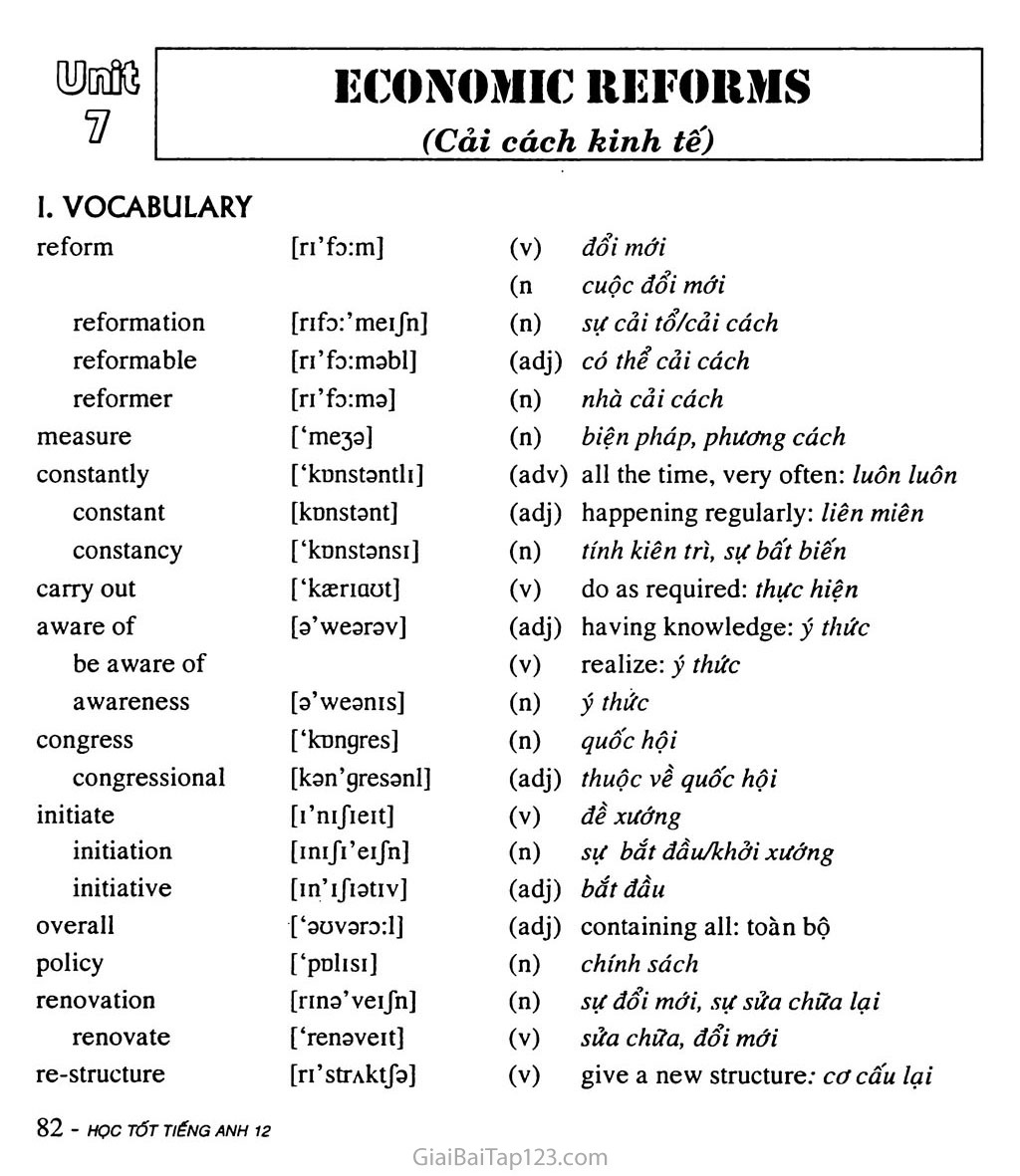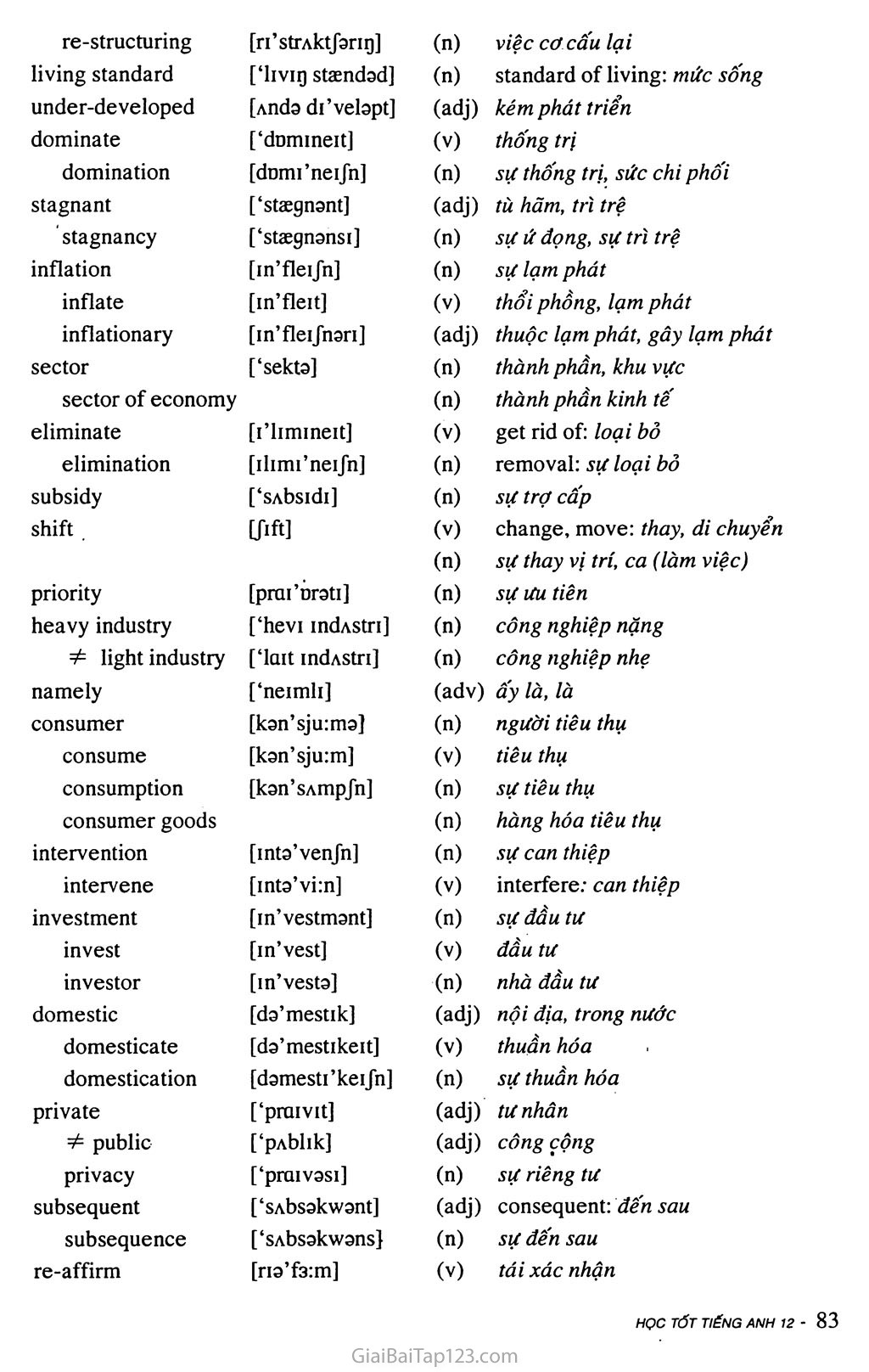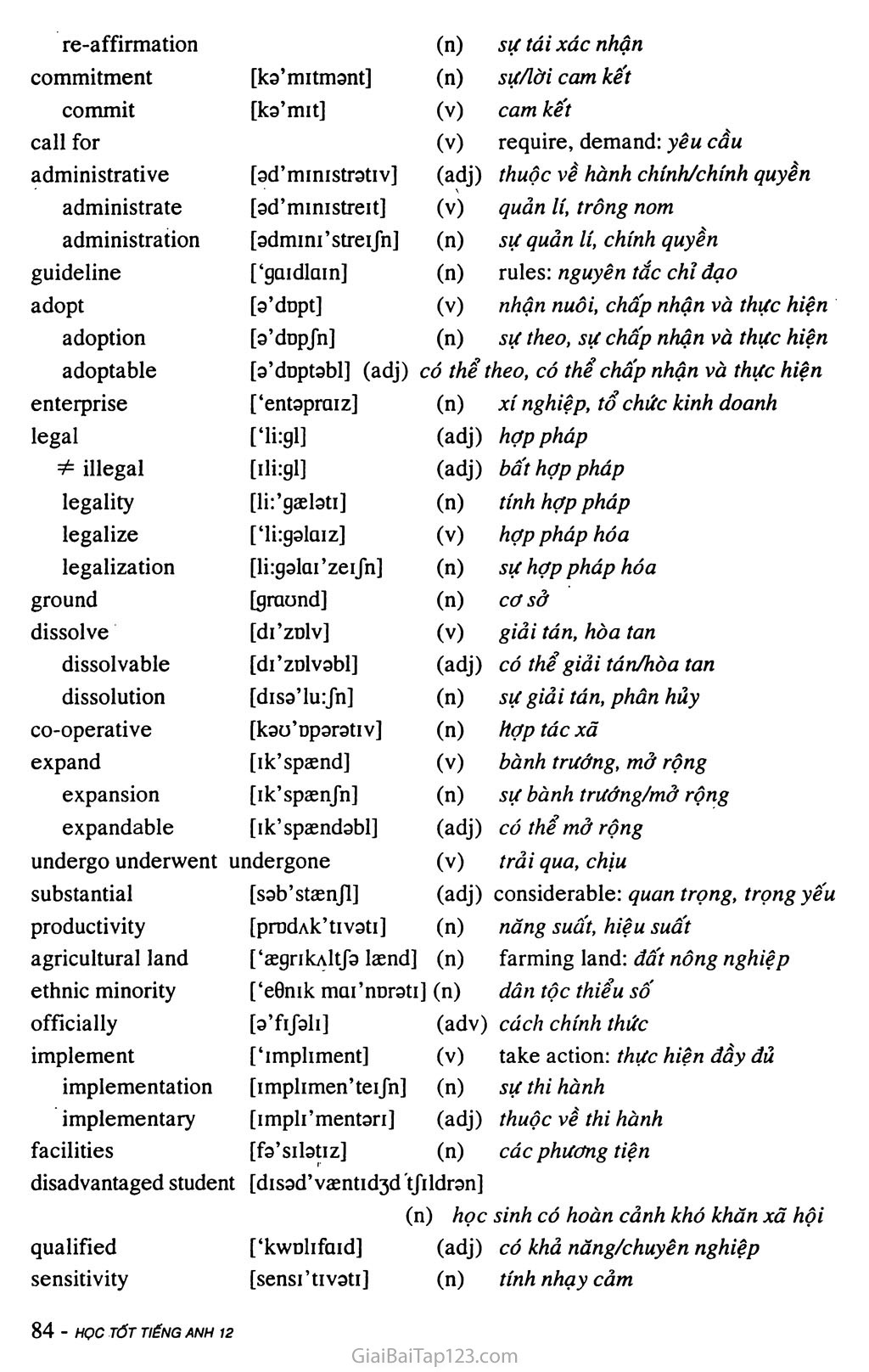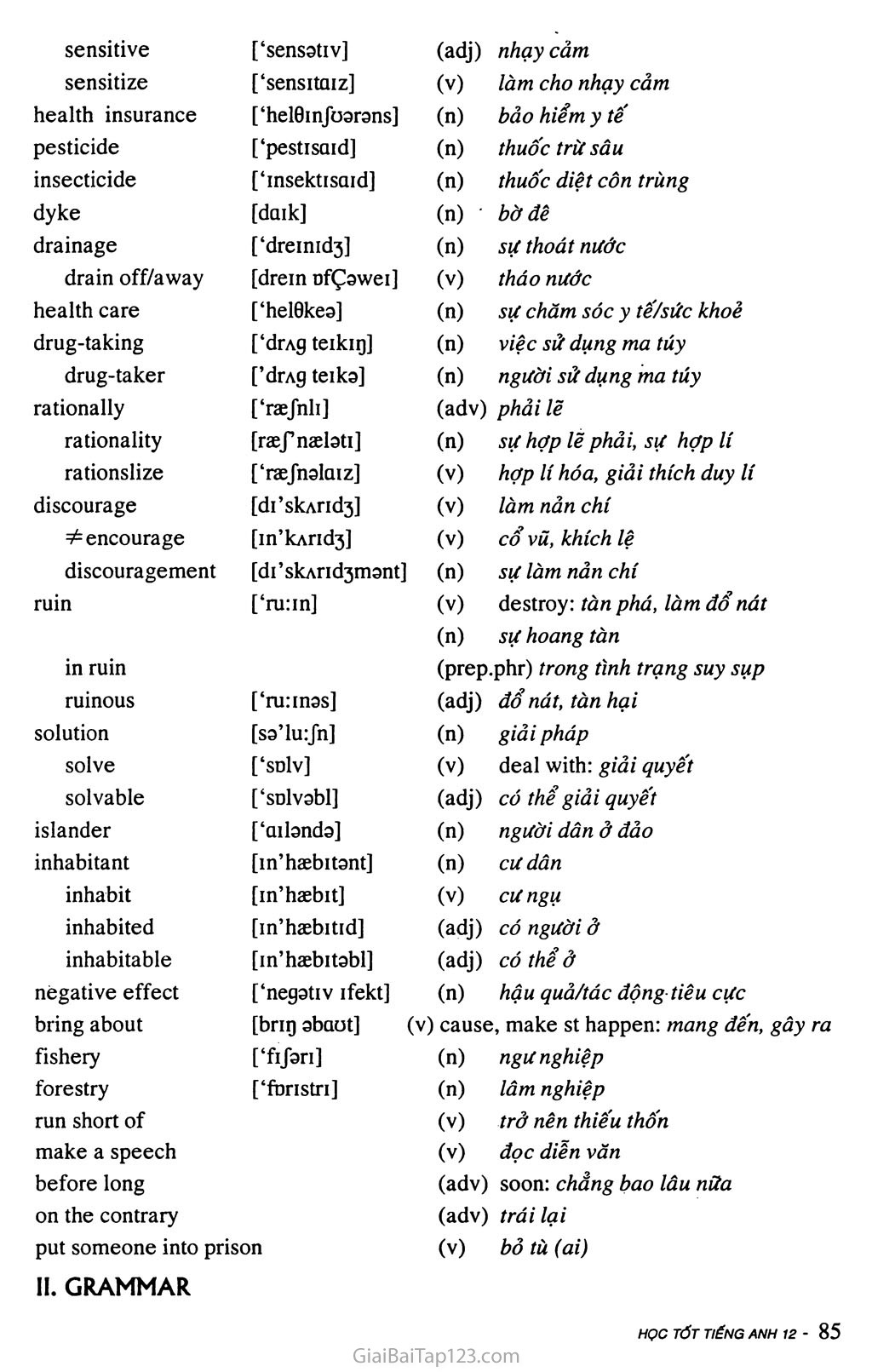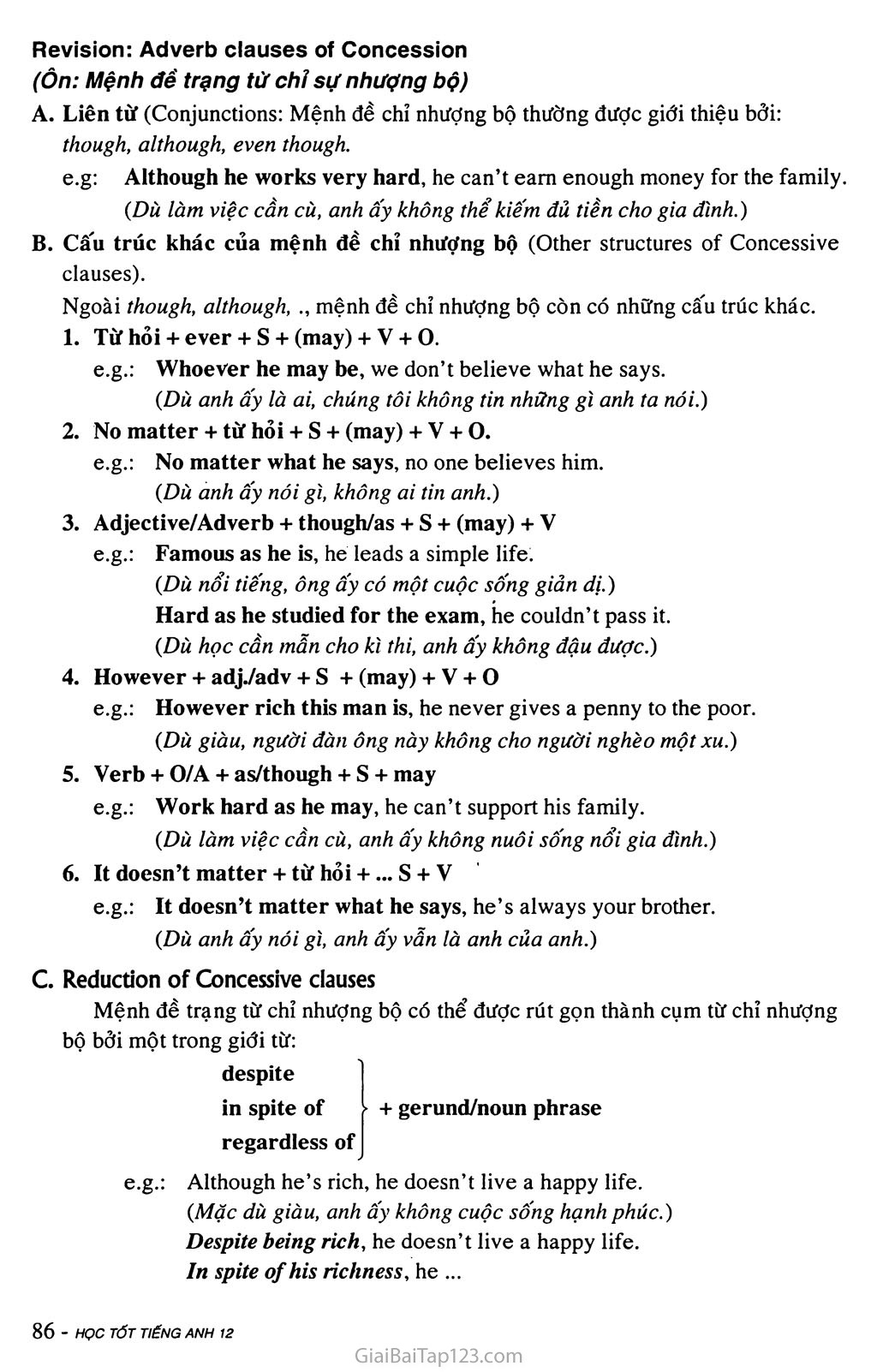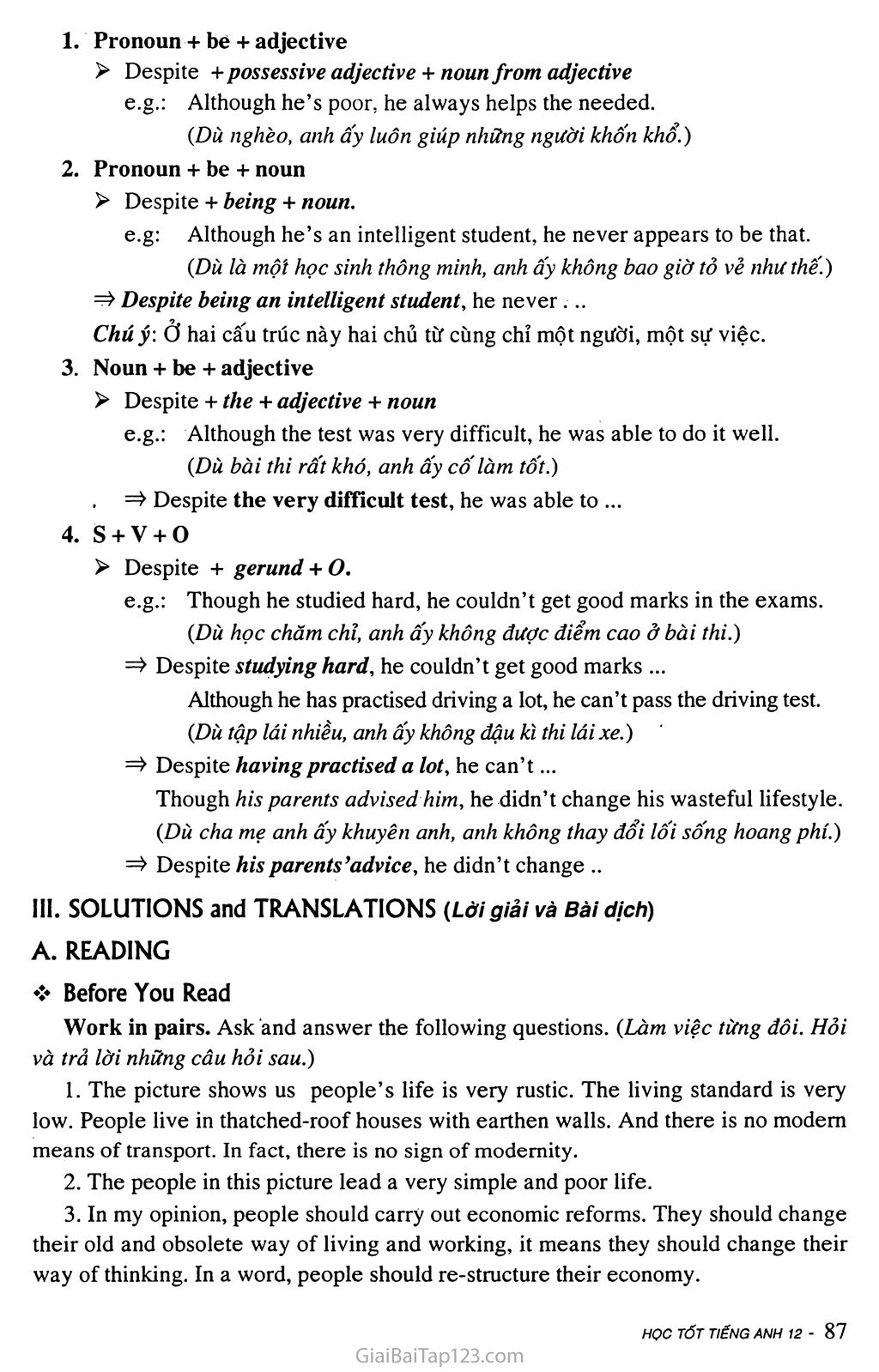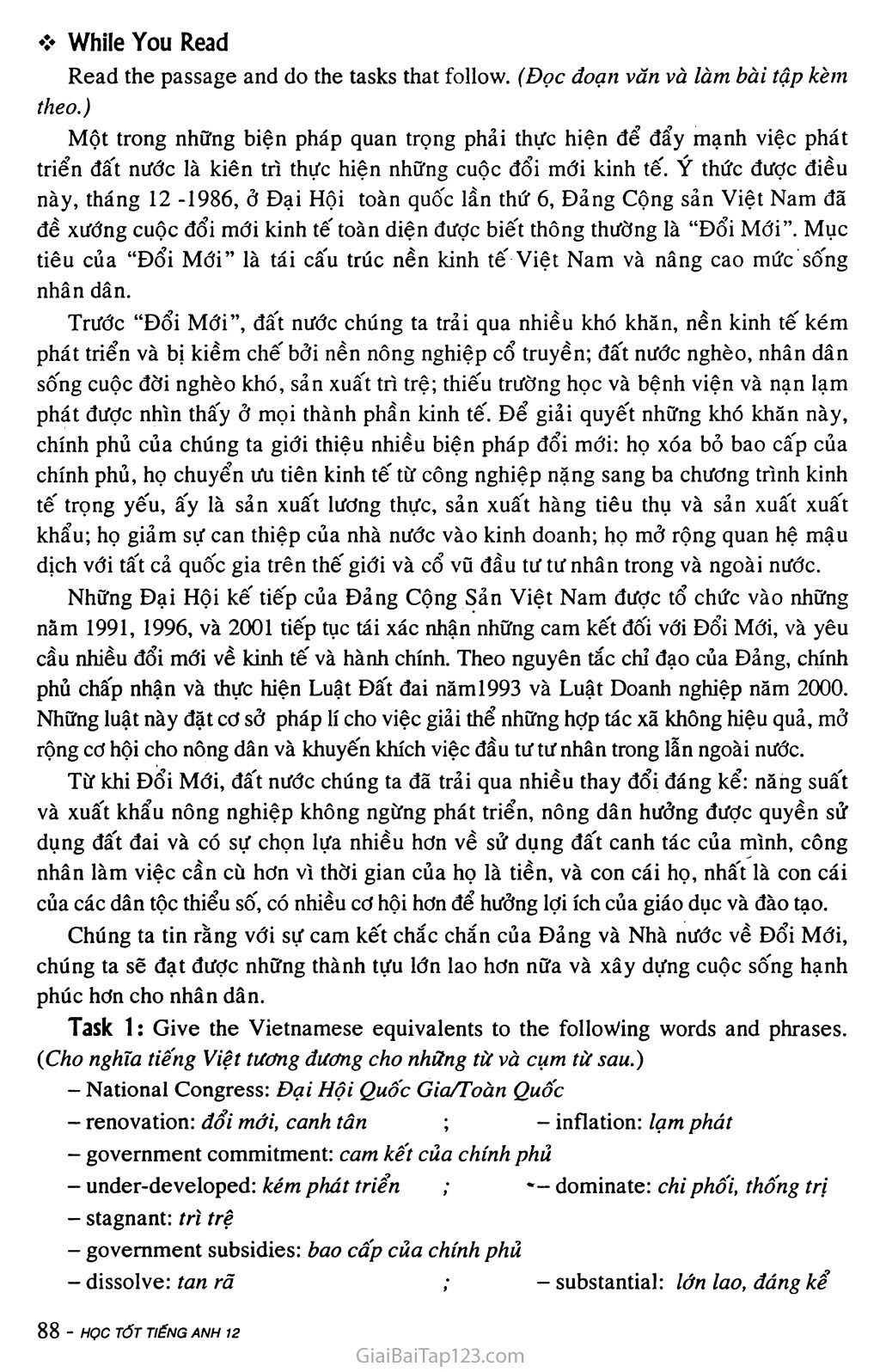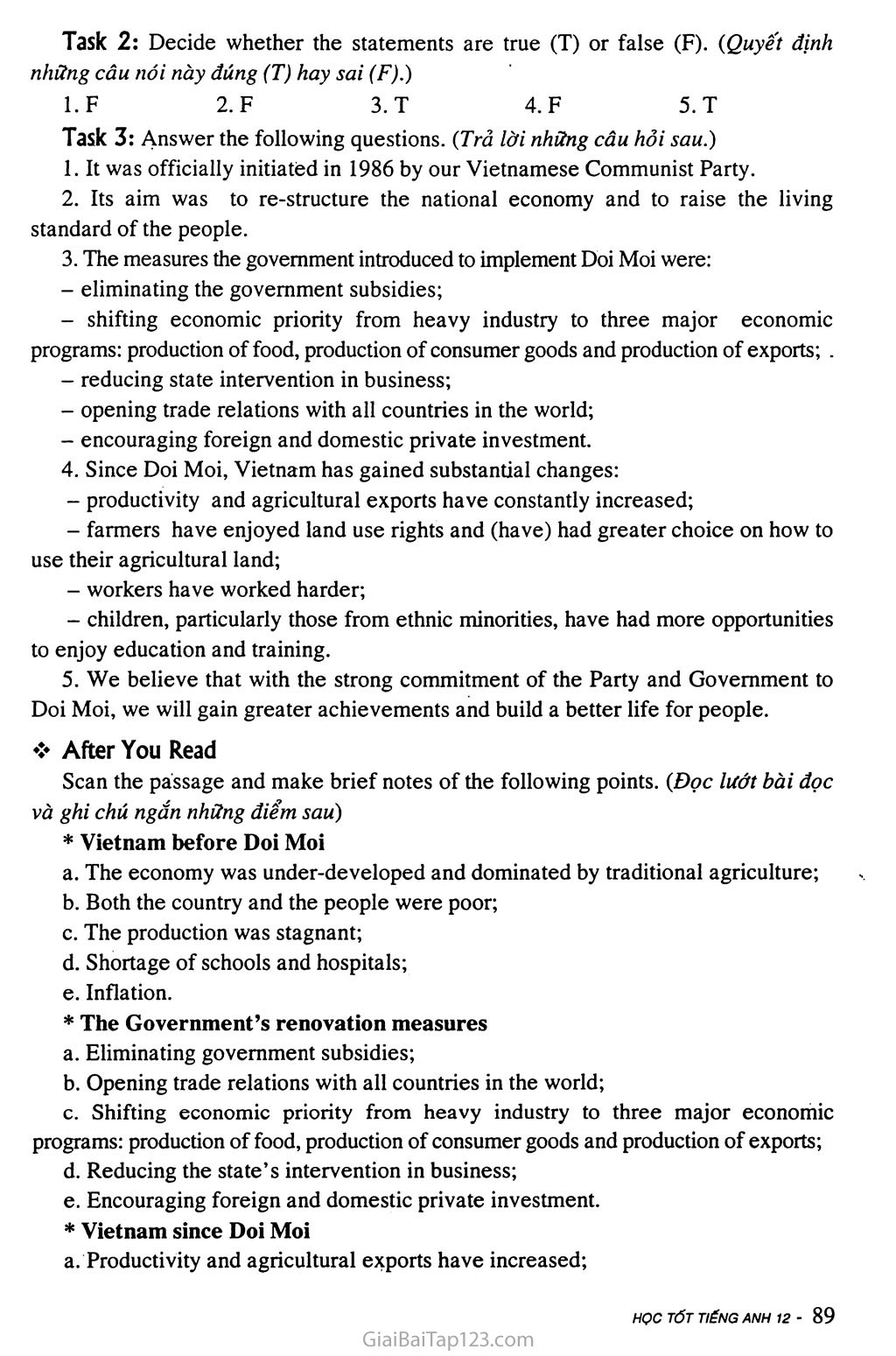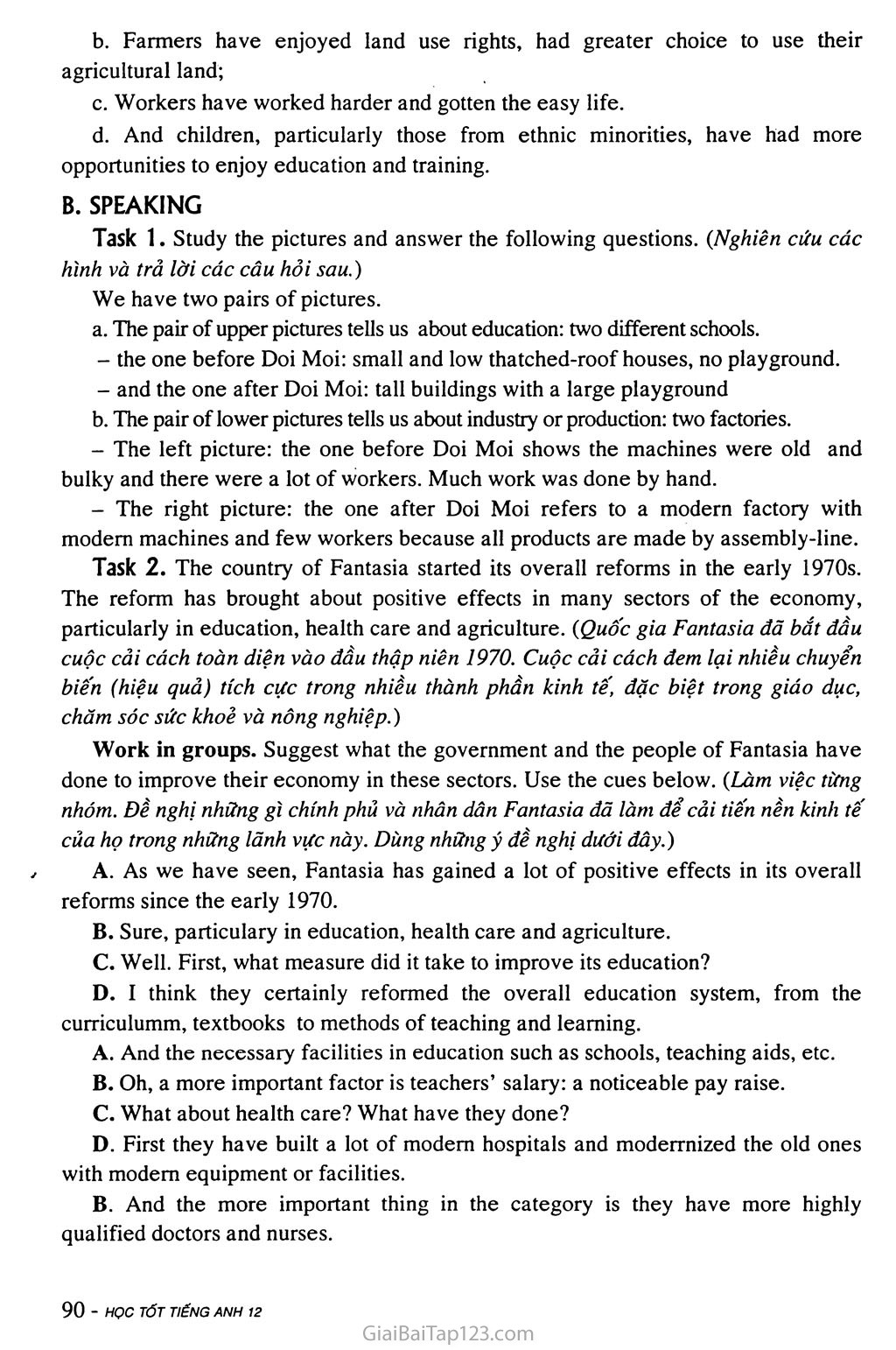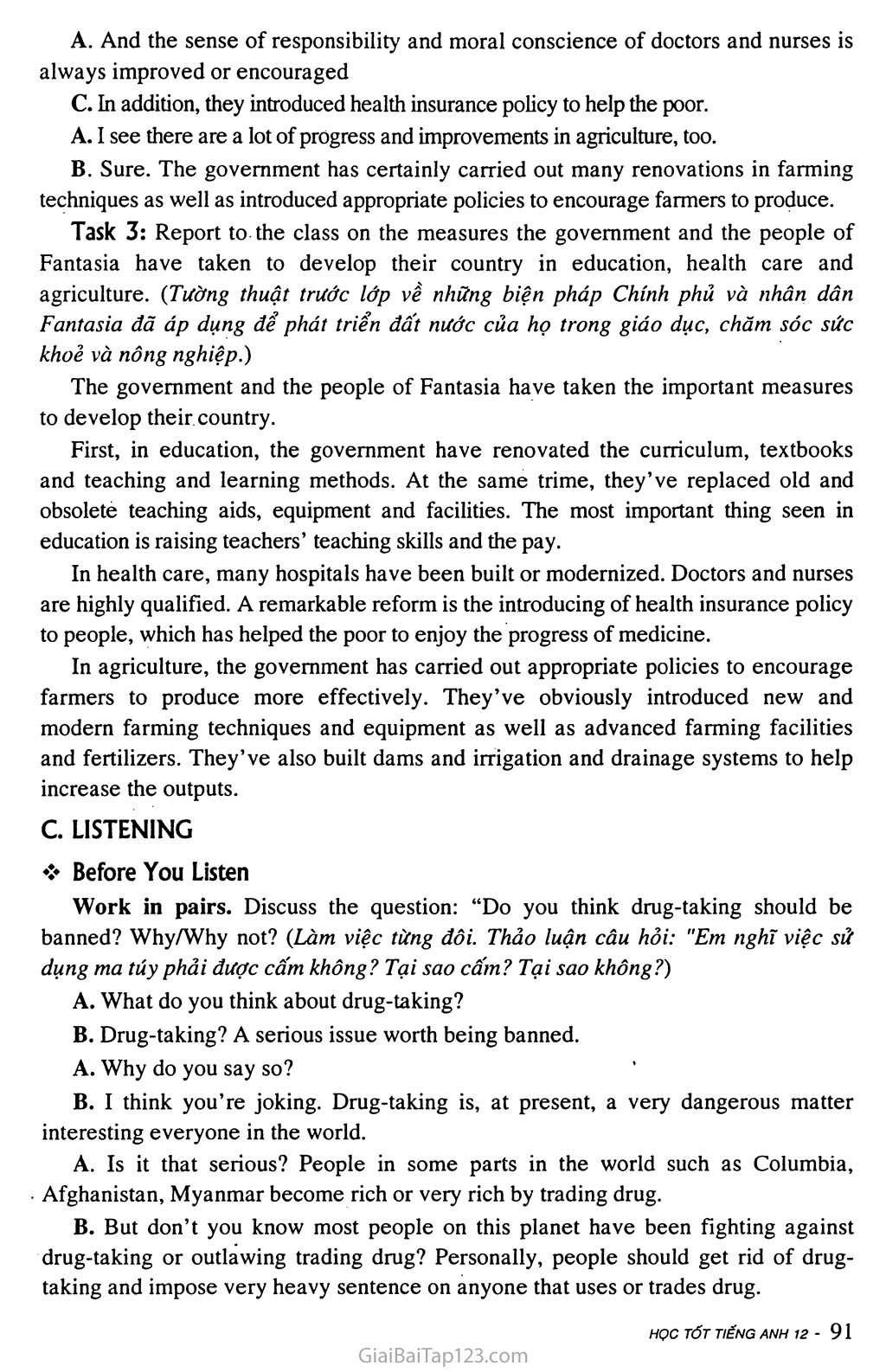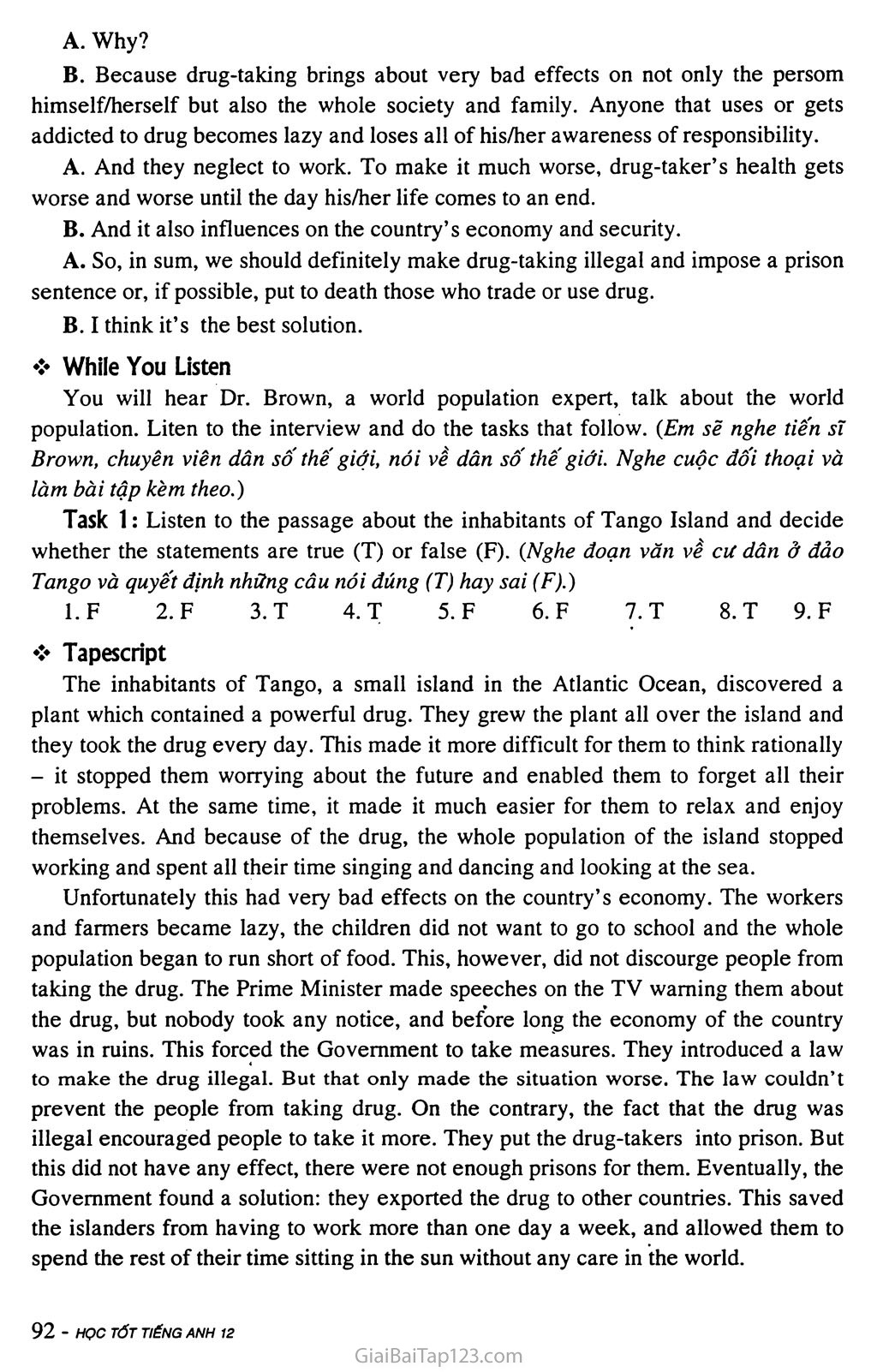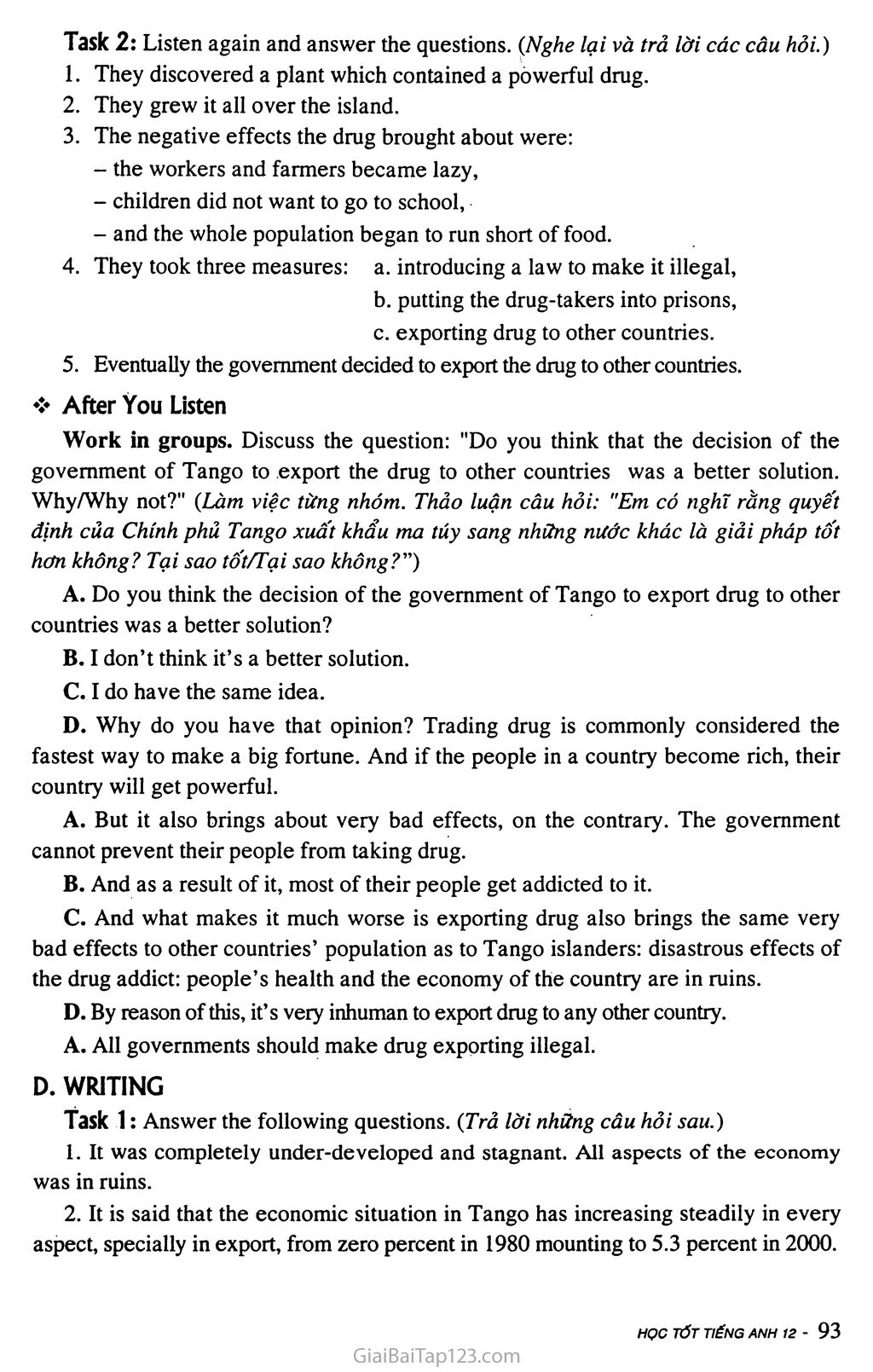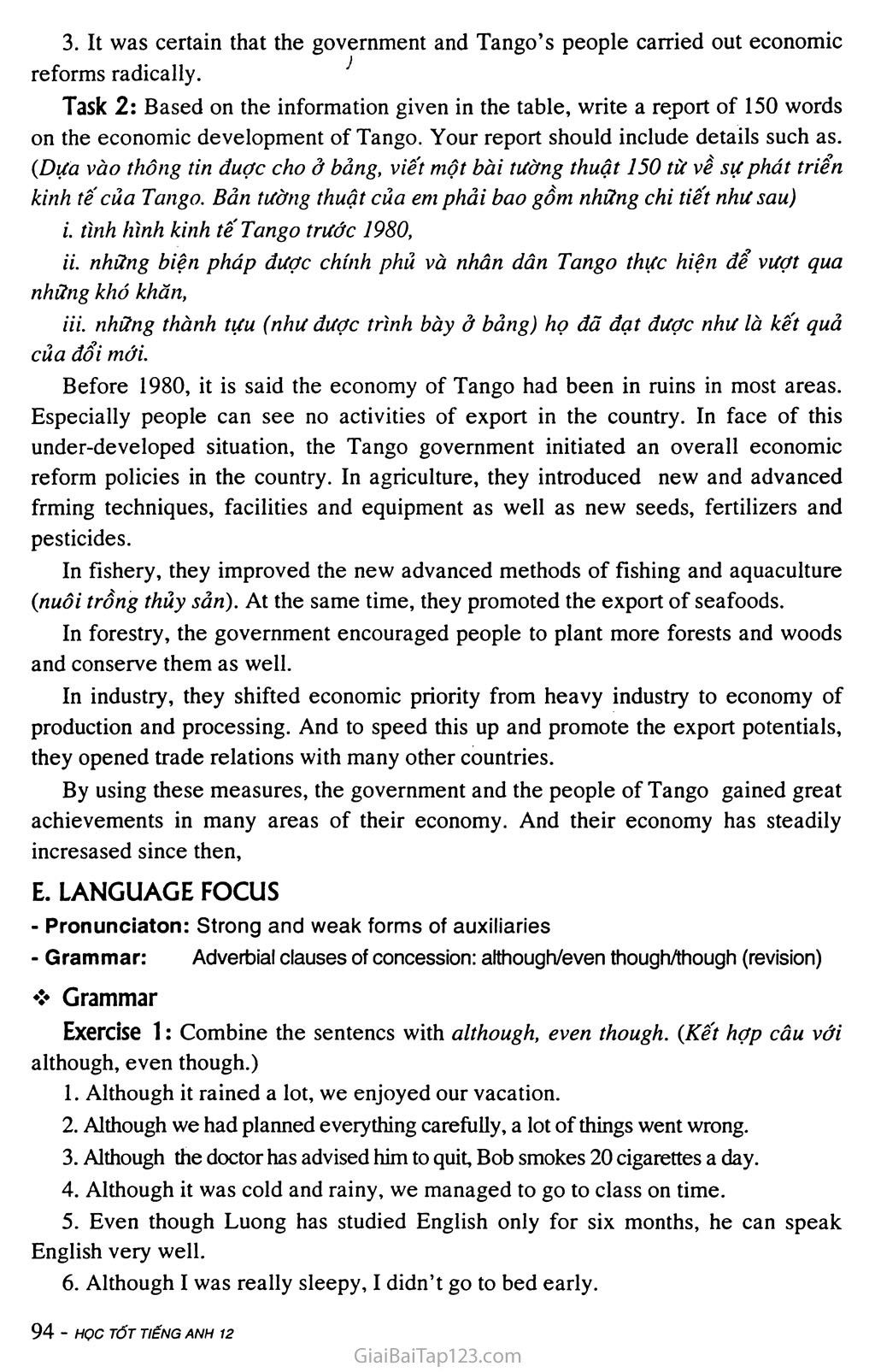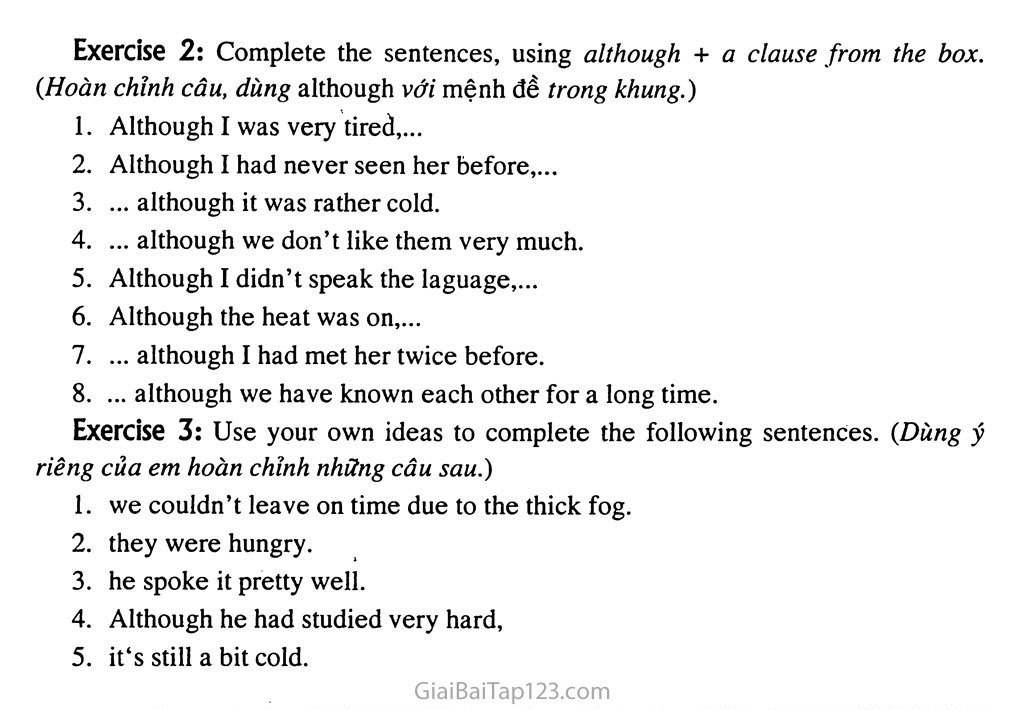Giải tiếng Anh lớp 12 Unit 7: ECONOMIC REFORMS
ECONOMIC REFORMS
(Cải cách kỉnh tế)
I. VOCABULARY
reform
[ri’fo:m]
(v) đổi mới
(n cuộc đổi mới
reformation
[rifor’meijh]
(n) sự cải tổ/cải cách
reformable
[ri’fo:m3bl]
(adj) có thể cải cách
reformer
[ri’fmmo]
(n) nhà cải cách
measure
[lme33]
(n) biện pháp, phương cách
constantly
[‘kunstontli]
(adv) all the time, very often: luôn luôn
constant
[knnstant]
(adj) happening regularly: liên miên
constancy
[‘knnstansi]
(n) tính kiên trì, sự bất biến
carry out
[‘kasriaot]
ịy) do as required: thực hiện
aware of
[o’wearev]
(adj) having knowledge: ý thức
be aware of
(v) realize: ý thức
awareness
[a’wesms]
(n) ý thức
congress
[‘kongres]
(n) quốc hội
congressional
[kon’gresanl]
(adj) thuộc về quốc hội
initiate
[I’nifieit]
(v) đề xướng
initiation
[inifi’eifn]
(n) sự bắt đầu/khởi xướng
initiative
[inTJmtiv]
(adj) bắt đầu
overall
[‘aovorod]
(adj) containing all: toàn bộ
policy
[‘pnlisi]
(n) chính sách
renovation
[rina’veijn]
(n) sự đổi mới, sự sửa chữa lại
renovate
[‘renaveit]
(y) sửa chữa, đổi mới
re-structure
[n’stTAktJb]
(v) give a new structure; cơ cấu lại
re-structuring
[ri’stTAktfarir)]
(n)
việc cơ cấu lại
living Standard
[‘liviq staendad]
(n)
standard of living: mức sống
under-developed
[Anda di’velapt]
(adj)
kém phát triển
dominate
[‘dDmineit]
(V)
thông trị
domination
[dnmi’neijn]
(n)
sự thống trị, sức chi phối
stagnant
[‘stasgnant]
(adj)
tù hãm, trì trệ
stagnancy
[‘staegnansi]
(n)
sự ứ đọng, sự trì trệ
inflation
[in’fleijn]
(n)
sự lạm phát
inflate
[in’fleit]
(V)
thổi phồng, lạm phát
inflationary
[in’fleijnari]
(adj)
thuộc lạm phát, gây lạm phát
sector
[‘sekta]
(n)
thành phần, khu vực
sector of economy
(n)
thành phần kinh tế
eliminate
[I’limineit]
(V)
get rid of: loại bỏ
elimination
[ilimi’neijn]
(n)
removal: sự loại bỏ
subsidy
[‘sAbsidt]
(n)
sự trợ cấp
shift
Uiftl
(V)
(n)
change, move: thay, di chuyển sự thay vị trí, ca (làm việc)
priority
[prai’nrati]
(n)
sự ưu tiên
heavy industry
[‘hevi indAStri]
(n)
công nghiệp nặng
=# light industry
[‘lait indAStri]
(n)
công nghiệp nhẹ
namely
[‘neimli]
(adv) ấy là, là
consumer
[kan’sju:ma]
(n)
người tiêu thụ
consume
[kan’sju:m]
(V)
tiêu thụ
consumption
[kan’sAinpJh]
(n)
sự tiêu thụ
consumer goods
(n)
hàng hóa tiêu thụ
intervention
[inta’venfn]
(n)
sự can thiệp
intervene
[inta’vim]
(V)
interfere: can thiệp
investment
[in’vestmant]
(n)
sự đầu tư
invest
[in’vest]
(V)
đầu tư
investor
[in’vesta]
(n)
nhà đầu tư
domestic
[da’mestik]
(adj)
nội địa, trong nước
domesticate
[da’mestikeit]
(V)
thuần hóa
domestication
[damestl’keijn]
(n)
sự thuần hóa
private
[‘prmvit]
(adj)
tư nhân
=# public
[‘pAblik]
(adj)
công cộng
privacy
[‘praivasi]
(n)
sự riêng tư
subsequent
[‘SAbsakwant]
(adj)
consequent: đến sau
subsequence
[‘sAbsakwans]
(n)
sự đến sau
re-affirm
[ria’f3:m]
(V)
tái xác nhận
re-affirmation
(n)
sự tái xác nhận
commitment
[ka’mitmsnt]
(n)
sự/lời cam kết
commit
[ks’mit]
(V)
cam kết
call for
(V)
require, demand: yêu cầu
administrative
[ad’mimstrstiv]
(adj)
thuộc về hành chính/chính quyền
administrate
[sd’mimstreit]
(V)
quản lí, trông nom
administration
[odmini’streijn]
(n)
sự quản lí, chính quyền
guideline
[‘guidlain]
(n)
rules: nguyên tắc chỉ đạo
adopt
[s’dDpt]
(V)
nhận nuôi, chấp nhận và thực hiện
adoption
[s’dtipjh]
(n)
sự theo, sự chấp nhận và thực hiện
adoptable
[o’dDptobl] (adj)
có thể theo, có thể chấp nhận và thực hiện
enterprise
[‘entsprcuz]
(n)
xí nghiệp, tổ chức kinh doanh
legal
i‘li:gl]
(adj)
hợp pháp
=# illegal
[Ili:gl]
(adj)
bất hợp pháp
legality
[li:’gael3ti]
(n)
tính hợp pháp
legalize
[‘lkgslaiz]
(V)
hợp pháp hóa
legalization
[lizgslai’zeijn]
(n)
sự hợp pháp hóa
ground
[graond]
(n)
cơ sở
dissolve
[dl’ZDlv]
(V)
giải tán, hòa tan
dissolvable
[di’zDlvsbl]
(adj)
có thể giải tán/hòa tan
dissolution
[diss’lujh]
(n)
sự giải tán, phân hủy
co-operative
[kso’Dpsrstiv]
(n)
hợp tác xã
expand
[ik’spaend]
(V)
bành trướng, mở rộng
expansion
[ik’spasnjn]
(n)
sự bành trướng/mở rộng
expandable
[ik’spasndsbl]
(adj)
có thể mở rộng
undergo underwent undergone
(V)
trải qua, chịu
substantial
[ssb’stasnjl]
(adj) considerable: quan trọng, trọng yếu
productivity
[prodAk’tivsti]
(n)
năng suất, hiệu suất
agricultural land
[‘iegrikAltfs laend]
(n)
farming land: đất nông nghiệp
ethnic minority
[‘e0nik mai’nDrsti] (n)
dân tộc thiểu sô'
officially
[3’flj3h]
(adv)
cách chính thức
implement
[‘impliment]
(v)
take action: thực hiện đầy đủ
implementation
[implimen’teijn]
(n)
sự thi hành
implementary
[implfmentsri]
(adj)
thuộc về thi hành
facilities
[fs’silatiz]
(n)
các phương tiện
disadvantaged student
[dissd’vamtidyd'tjildran]
(n)
học sinh có hoàn cảnh khó khăn xã hội
qualified
[‘kwDlifaid]
(adj)
có khả năng/chuyên nghiệp
sensitivity
[sensi’tivati]
(n)
tính nhạy cảm
sensitive
[‘sensotiv]
(adj)
nhạy cảm
sensitize
[‘sensitaiz]
(V)
làm cho nhạy cảm
health insurance
[‘helSinfoarans]
(n)
bảo hiểm y tế
pesticide
[‘pestisaid]
(n)
thuốc trừ sâu
insecticide
[‘insektisaid]
(n)
thuốc diệt côn trùng
dyke
[daik]
(n)
bờ đê
drainage
[ldreinid3]
(n)
sự thoát nước
drain off/away
[drein DfỌawei]
(V)
tháo nước
health care
[‘helSkeo]
(n)
sự chăm sóc y tế/sức khoẻ
drug-taking
[‘drAg teikig]
(n)
việc sử dụng ma túy
drug-taker
[’drAg teiko]
(n)
người sử dụng ma túy
rationally
[‘raefnli]
(adv) phải lẽ
rationality
[rasfnaelati]
(n)
sự hợp lẽ phải, sự hợp lí
rationslize
[‘raejnalaiz]
(V)
hợp lí hóa, giải thích duy lí
discourage
[di’skArid3]
(V)
làm nản chí
=# encourage
[in’kArid3]
(V)
cổ vũ, khích lệ
discouragement
[di’skArid3m3nt]
(n)
sự làm nản chí
ruin
[*ru:in]
(V)
(n)
destroy: tàn phá, làm đổ nát sự hoang tàn
in ruin
(prep.phr) trong tình trạng suy sụp
ruinous
[‘rurinas]
(adj)
đổ nát, tàn hại
solution
[sa’lmjn]
(n)
giải pháp
solve
[‘sdIv]
(V)
deal with: giải quyết
solvable
[‘snlvabl]
(adj)
có thể giải quyết
islander
[‘ailands]
(n)
người dân ở đảo
inhabitant
[in’haebitant]
(n)
cư dân
inhabit
[in’hasbit]
(V)
cư ngụ
inhabited
[in’haebitid]
(adj)
có người ở
inhabitable
[in’haebitabl]
(adj)
có thể ở
negative effect
[‘negativ ifekt]
(n)
hậu quả/tác động tiêu cực
bring about
[brig abacs t]
(v) cause, make St happen: mang đến,
fishery
[‘fifsn]
(n)
ngư nghiệp
forestry
[‘foristri]
(n)
lầm nghiệp
run short of
(V)
trở nên thiếu thốn
make a speech
(V)
đọc diễn vãn
before long
(adv)
soon: chẳng bao lâu nữa
on the contrary
(adv) trái lại
put someone into prison
(V)
bỏ tù (ai)
II. GRAMMAR
Revision: Adverb clauses of Concession
(Ôn: Mệnh đề trạng từ chỉ sự nhượng bộ)
Liên từ (Conjunctions: Mệnh đề chỉ nhượng bộ thường được giới thiệu bởi: though, although, even though.
e.g: Although he works very hard, he can’t earn enough money for the family. (Dù làm việc cần cù, anh ấy không thể kiếm đủ tiền cho gia đình.)
Cấu trúc khác của mệnh đề chỉ nhưựng bộ (Other structures of Concessive clauses).
Ngoài though, although, ., mệnh đề chỉ nhượng bộ còn có những cấu trúc khác.
Từ hỏi + ever + s + (may) + V + 0.
e.g.: Whoever he may be, we don’t believe what he says.
(Dù anh ẩy là ai, chúng tôi không tin những gì anh ta nói.)
No matter + từ hỏi + s + (may) + V + o.
e.g.: No matter what he says, no one believes him.
(Dù anh ấy nói gì, không ai tin anh.)
Adjective/Adverb + though/as + s + (may) + V e.g.: Famous as he is, he leads a simple life.
(Dù nổi tiếng, ông ấy có một cuộc sống giản dị.)
Hard as he studied for the exam, he couldn’t pass it.
(Dù học cần mẫn cho kì thi, anh ấy không đậu được.)
However + adj./adv + s + (may) + V + o
e.g.: However rich this man is, he never gives a penny to the poor.
(Dù giàu, người đàn ông này không cho người nghèo một xu.)
Verb + 0/A + as/though + s + may
e.g.: Work hard as he may, he can’t support his family.
(Dù làm việc cần cù, anh ấy không nuôi sống nổi gia đình.)
It doesn’t matter + từ hỏi +... s + V
e.g.: It doesn’t matter what he says, he’s always your brother.
(Dù anh ấy nói gì, anh ấy vẫn là anh của anh.)
Reduction of Concessive clauses
Mệnh đề trạng từ chỉ nhượng bộ có thể được rút gọn thành cụm từ chỉ nhượng bộ bởi một trong giới từ:
despite
in spite of + gerund/noun phrase regardless of
e.g.: Although he’s rich, he doesn’t live a happy life.
(Mặc dù giàu, anh ấy không cuộc sống hạnh phúc.) Despite being rich, he doesn’t live a happy life.
In spite of his richness, he ...
Pronoun + be + adjective
Despite + possessive adjective + noun from adjective e.g.: Although he’s poor, he always helps the needed.
(Dù nghèo, anh ấy luôn giúp những người khốn khổ.)
Pronoun + be + noun
Despite + being + noun.
e.g: Although he’s an intelligent student, he never appears to be that.
(Dm là mộí học sinh thông minh, anh ấy không bao giờ tỏ vẻ như thế.)
=> Despite being an intelligent student, he never . ..
Chú ý: Ở hai cấu trúc này hai chủ từ cùng chỉ một người, một sự việc.
Noun + be + adjective
Despite + the + adjective + noun
e.g.: Although the test was very difficult, he was able to do it well.
(Dm bài thi rất khó, anh ấy cố làm tốt.)
=> Despite the very difficult test, he was able to ...
s + v + o
Despite + gerund + o.
e.g.: Though he studied hard, he couldn’t get good marks in the exams. (Dm học chăm chỉ, anh ấy không được điểm cao ở bài thi.)
=> Despite studying hard, he couldn’t get good marks ...
Although he has practised driving a lot, he can’t pass the driving test. (Dm tập lái nhiều, anh ấy không đậu kì thi lái xe.)
=> Despite having practised a lot, he can’t...
Though his parents advised him, he didn’t change his wasteful lifestyle. (Dm cha mẹ anh ấy khuyên anh, anh không thay đổi lối sống hoang phí.)
=> Despite his parents’advice, he didn’t change ..
III. SOLUTIONS and TRANSLATIONS (Lời giải và Bài dịch)
A. READING
❖ Before You Read
Work in pairs. Ask and answer the following questions. (Làm việc từng đôi. Hỏi và trả lời những câu hỏi sau.)
The picture shows US people’s life is very rustic. The living standard is very low. People live in thatched-roof houses with earthen walls. And there is no modem means of transport. In fact, there is no sign of modernity.
The people in this picture lead a very simple and poor life.
In my opinion, people should carry out economic reforms. They should change their old and obsolete way of living and working, it means they should change their way of thinking. In a word, people should re-structure their economy.
❖ While You Read
Read the passage and do the tasks that follow. (Đọc đoạn văn và làm bài tập kèm theo.)
Một trong những biện pháp quan trọng phải thực hiện để đẩy mạnh việc phát triển đất nước là kiên trì thực hiện những cuộc đổi mới kinh tế. Ý thức được điều này, tháng 12 -1986, ở Đại Hội toàn quốc lần thứ 6, Đảng Cộng sản Việt Nam đã đề xướng cuộc đổi mới kinh tế toàn diện được biết thông thường là “Đổi Mới”. Mục tiêu của “Đổi Mới” là tái câu trúc nền kinh tế Việt Nam và nâng cao mức sổng nhân dân.
Trước “Đổi Mới”, đẩt nước chúng ta trải qua nhiều khó khăn, nền kinh tế kém phát triển và bị kiềm chế bởi nền nông nghiệp cổ truyền; đất nước nghèo, nhân dân sông cuộc đời nghèo khó, sản xuâ"t trì trệ; thiếu trường học và bệnh viện và nạn lạm phát được nhìn thây ở mọi thành phần kinh tế. Để giải quyết những khó khăn này, chính phủ của chúng ta giới thiệu nhiều biện pháp đổi mới: họ xóa bỏ bao câp của chính phủ, họ chuyển ưu tiên kinh tế từ công nghiệp nặng sang ba chương trình kinh tế trọng yếu, ây là sản xuất lương thực, sản xuất hàng tiêu thụ và sản xuâ"t xuâ"t khẩu; họ giảm sự can thiệp của nhà nước vào kinh doanh; họ mở rộng quan hệ mậu dịch với tất cả quốc gia trên thế giới và cổ vũ đầu tư tư nhân trong và ngoài nước.
Những Đại Hội kế tiếp của Đảng Cộng Sản Việt Nam được tổ chức vào những năm 1991, 1996, và 2001 tiếp tục tái xác nhận những cam kết đôi với Đổi Mới, và yêu cầu nhiều đổi mới về kinh tế và hành chính. Theo nguyên tắc chỉ đạo của Đảng, chính phủ chấp nhận và thực hiện Luật Đất đai năm 1993 và Luật Doanh nghiệp nãm 2000. Những luật này đặt cơ sở pháp lí cho việc giải thể những hợp tác xã không hiệu quả, mở rộng cơ hội cho nông dân và khuyên khích việc đầu tư tư nhân trong lẫn ngoài nước.
Từ khi Đổi Mới, đất nước chúng ta đã trải qua nhiều thay đổi đáng kể: năng suất và xuất khẩu nông nghiệp không ngừng phát triển, nông dân hưởng được quyền sử dụng đất đai và có sự chọn lựa nhiều hơn về sử dụng đâì canh tác của mình, công nhân làm việc cần cù hơn vì thời gian của họ là tiền, và con cái họ, nhất là con cái của các dân tộc thiểu sô", có nhiều cơ hội hơn để hưởng lợi ích của giáo dục và đào tạo.
Chúng ta tin rằng với sự cam kết chắc chắn của Đảng và Nhà nước về Đổi Mới, chúng ta sẽ đạt được những thành tựu lớn lao hơn nữa và xây dựng cuộc sông hạnh phúc hơn cho nhân dân.
Task 1: Give the Vietnamese equivalents to the following words and phrases. (Cho nghĩa tiếng Việt tương đương cho những từ và cụm từ sau.)
National Congress: Đại Hội Quốc Gia/Toàn Quốc
renovation: đổi mới, canh tân ; - inflation: lạm phát
government commitment: cam kết của chính phủ
under-developed: kém phát triền ; — dominate: chi phối, thống trị
stagnant: trì trệ
government subsidies: bao cấp của chính phủ
dissolve: tan rã ; - substantial: lớn lao, đáng kể
Task 2: Decide whether the statements are true (T) or false (F). (Quyết định những câu nói này đúng (T) hay sai (F).)
F 2.F 3.T 4.F 5. T
Task 3: Answer the following questions. (Trả lời những câu hỏi sau.)
It was officially initiated in 1986 by our Vietnamese Communist Party.
Its aim was to re-structure the national economy and to raise the living standard of the people.
The measures the government introduced to implement Doi Moi were:
eliminating the government subsidies;
shifting economic priority from heavy industry to three major economic programs: production of food, production of consumer goods and production of exports; .
reducing state intervention in business;
opening trade relations with all countries in the world;
encouraging foreign and domestic private investment.
Since Doi Moi, Vietnam has gained substantial changes:
productivity and agricultural exports have constantly increased;
farmers have enjoyed land use rights and (have) had greater choice on how to use their agricultural land;
workers have worked harder;
children, particularly those from ethnic minorities, have had more opportunities to enjoy education and training.
We believe that with the strong commitment of the Party and Government to Doi Moi, we will gain greater achievements and build a better life for people.
❖ After You Read
Scan the passage and make brief notes of the following points. (Đọc lướt bài đọc và ghi chú ngắn những điểm sau)
Vietnam before Doi Moi
The economy was under-developed and dominated by traditional agriculture;
Both the country and the people were poor;
The production was stagnant;
Shortage of schools and hospitals;
Inflation.
The Government’s renovation measures
Eliminating government subsidies;
Opening trade relations with all countries in the world;
Shifting economic priority from heavy industry to three major economic programs: production of food, production of consumer goods and production of exports;
Reducing the state’s intervention in business;
Encouraging foreign and domestic private investment.
Vietnam since Doi Moi
Productivity and agricultural exports have increased;
Farmers have enjoyed land use rights, had greater choice to use their agricultural land;
Workers have worked harder and gotten the easy life.
And children, particularly those from ethnic minorities, have had more opportunities to enjoy education and training.
B. SPEAKING
Task 1. Study the pictures and answer the following questions. (Nghiên cứu các hình và trả lời các câu hỏi sau.)
We have two pairs of pictures.
The paừ of upper pictures tells us about education: two different schools.
the one before Doi Moi: small and low thatched-roof houses, no playground.
and the one after Doi Moi: tall buildings with a large playground
The pair of lower pictures tells us about industry or production: two factories.
The left picture: the one before Doi Moi shows the machines were old and bulky and there were a lot of workers. Much work was done by hand.
The right picture: the one after Doi Moi refers to a modern factory with modern machines and few workers because all products are made by assembly-line.
Task 2. The country of Fantasia started its overall reforms in the early 1970s. The reform has brought about positive effects in many sectors of the economy, particularly in education, health care and agriculture. (Quốc gia Fantasia đã bắt đầu cuộc cải cách toàn diện vào đầu thập niên 1970. Cuộc cải cách đem lại nhiều chuyển biến (hiệu quả) tích cực trong nhiều thành phần kỉnh tế, đặc biệt trong giáo dục, chăm sóc sức khoẻ và nông nghiệp.)
Work in groups. Suggest what the government and the people of Fantasia have done to improve their economy in these sectors. Use the cues below. (Làm việc từng nhóm. Đề nghị những gì chính phủ và nhân dân Fantasia đã làm đề cải tiến nền kinh tế của họ trong những lãnh vực này. Dùng những ý đề nghị dưới đây.)
* A. As we have seen, Fantasia has gained a lot of positive effects in its overall reforms since the early 1970.
B. Sure, particulary in education, health care and agriculture.
Well. First, what measure did it take to improve its education?
D. I think they certainly reformed the overall education system, from the curriculumm, textbooks to methods of teaching and learning.
And the necessary facilities in education such as schools, teaching aids, etc.
Oh, a more important factor is teachers’ salary: a noticeable pay raise, c. What about health care? What have they done?
D. First they have built a lot of modern hospitals and moderrnized the old ones with modem equipment or facilities.
B. And the more important thing in the category is they have more highly qualified doctors and nurses.
A. And the sense of responsibility and moral conscience of doctors and nurses is always improved or encouraged
c. In addition, they introduced health insurance policy to help the poor.
I see there are a lot of progress and improvements in agriculture, too.
Sure. The government has certainly carried out many renovations in farming techniques as well as introduced appropriate policies to encourage farmers to produce.
Task 3: Report to the class on the measures the government and the people of Fantasia have taken to develop their country in education, health care and agriculture. (Tường thuật trước lớp về những biện pháp Chính phủ và nhân dân Fantasia đã áp dụng để phát triển đất nước của họ trong giáo dục, chăm sóc sức khoẻ và nông nghiệp.)
The government and the people of Fantasia have taken the important measures to develop their country.
First, in education, the government have renovated the curriculum, textbooks and teaching and learning methods. At the same trime, they’ve replaced old and obsolete teaching aids, equipment and facilities. The most important thing seen in education is raising teachers’ teaching skills and the pay.
In health care, many hospitals have been built or modernized. Doctors and nurses are highly qualified. A remarkable reform is the introducing of health insurance policy to people, which has helped the poor to enjoy the progress of medicine.
In agriculture, the government has carried out appropriate policies to encourage farmers to produce more effectively. They’ve obviously introduced new and modern farming techniques and equipment as well as advanced farming facilities and fertilizers. They’ve also built dams and irrigation and drainage systems to help increase the outputs.
c. LISTENING
❖ Before You Listen
Work in pairs. Discuss the question: “Do you think drug-taking should be banned? Why/Why not? (Làm việc từng đôi. Thảo luận câu hỏi: "Em nghĩ việc sử dụng ma túy phải được cấm không? Tại sao cấm? Tại sao không?)
What do you think about drug-taking?
Drug-taking? A serious issue worth being banned.
Why do you say so?
I think you’re joking. Drug-taking is, at present, a very dangerous matter interesting everyone in the world.
Is it that serious? People in some parts in the world such as Columbia, Afghanistan, Myanmar become rich or very rich by trading drug.
But don’t you know most people on this planet have been fighting against drug-taking or outlawing trading drug? Personally, people should get rid of drug taking and impose very heavy sentence on anyone that uses or trades drug.
Why?
Because drug-taking brings about very bad effects on not only the persom himself/herself but also the whole society and family. Anyone that uses or gets addicted to drug becomes lazy and loses all of his/her awareness of responsibility.
And they neglect to work. To make it much worse, drug-taker’s health gets worse and worse until the day his/her life comes to an end.
And it also influences on the country’s economy and security.
So, in sum, we should definitely make drug-taking illegal and impose a prison sentence or, if possible, put to death those who trade or use drug.
I think it’s the best solution.
While You Listen
You will hear Dr. Brown, a world population expert, talk about the world population. Liten to the interview and do the tasks that follow. (Em sẽ nghe tiến sĩ Brown, chuyên viên dân số thê' giới, nói về dân sô' thê' giới. Nghe cuộc đối thoại và làm bài tập kèm theo.)
Task 1 : Listen to the passage about the inhabitants of Tango Island and decide whether the statements are true (T) or false (F). (Nghe đoạn văn về cư dân d đảo Tango và quyết định những câu nói đúng (T) hay sai (F).)
F 2. F 3.T 4. T 5. F 6. F 7. T 8. T 9. F
Tapescript
The inhabitants of Tango, a small island in the Atlantic Ocean, discovered a plant which contained a powerful drug. They grew the plant all over the island and they took the drug every day. This made it more difficult for them to think rationally - it stopped them worrying about the future and enabled them to forget all their problems. At the same time, it made it much easier for them to relax and enjoy themselves. And because of the drug, the whole population of the island stopped working and spent all their time singing and dancing and looking at the sea.
Unfortunately this had very bad effects on the country’s economy. The workers and farmers became lazy, the children did not want to go to school and the whole population began to run short of food. This, however, did not discourge people from taking the drug. The Prime Minister made speeches on the TV warning them about the drug, but nobody took any notice, and before long the economy of the country was in ruins. This forced the Government to take measures. They introduced a law to make the drug illegal. But that only made the situation worse. The law couldn’t prevent the people from taking drug. On the contrary, the fact that the drug was illegal encouraged people to take it more. They put the drug-takers into prison. But this did not have any effect, there were not enough prisons for them. Eventually, the Government found a solution: they exported the drug to other countries. This saved the islanders from having to work more than one day a week, and allowed them to spend the rest of their time sitting in the sun without any care in the world.
Task 2: Listen again and answer the questions. {Nghe lại và trả lời các câu hỏi.)
They discovered a plant which contained a powerful drug.
They grew it all over the island.
The negative effects the drug brought about were:
the workers and farmers became lazy,
children did not want to go to school,
and the whole population began to run short of food.
They took three measures: a. introducing a law to make it illegal,
putting the drug-takers into prisons,
exporting drug to other countries.
Eventually the government decided to export the drug to other countries.
❖ After You Listen
Work in groups. Discuss the question: "Do you think that the decision of the government of Tango to export the drug to other countries was a better solution. Why/Why not?" {Làm việc từng nhóm. Thảo luận câu hỏi: "Em có nghĩ rằng quyết định của Chính phủ Tango xuất khẩu ma túy sang những nước khác là giải pháp tốt hơn không? Tại sao tốt/Tạỉ sao không?”)
Do you think the decision of the government of Tango to export drug to other countries was a better solution?
I don’t think it’s a better solution, c. I do have the same idea.
D. Why do you have that opinion? Trading drug is commonly considered the fastest way to make a big fortune. And if the people in a country become rich, their country will get powerful.
But it also brings about very bad effects, on the contrary. The government cannot prevent their people from taking drug.
And as a result of it, most of their people get addicted to it.
c. And what makes it much worse is exporting drug also brings the same very bad effects to other countries’ population as to Tango islanders: disastrous effects of the drug addict: people’s health and the economy of the country are in ruins.
D. By reason of this, it’s very inhuman to export drug to any other country.
A. All governments should make drug exporting illegal.
D. WRITING
Task 1 : Answer the following questions. {Trả lời những câu hỏi sau.)
It was completely under-developed and stagnant. All aspects of the economy was in ruins.
It is said that the economic situation in Tango has increasing steadily in every aspect, specially in export, from zero percent in 1980 mounting to 5.3 percent in 2000.
It was certain that the government and Tango’s people carried out economic reforms radically.
Task 2: Based on the information given in the table, write a report of 150 words on the economic development of Tango. Your report should include details such as. {Dựa vào thông tin đuợc cho ở bảng, viết một bài tường thuật 150 từ về sự phát triển kinh tê' của Tango. Bản tường thuật của em phải bao gồm những chi tiết như sau)
tình hình kinh tế Tango trước 1980,
những biện pháp được chính phủ và nhân dân Tango thực hiện để vượt qua những khó khăn,
những thành tựu (như được trình bày ở bảng) họ đã đạt được như là kết quả của đổi mới.
Before 1980, it is said the economy of Tango had been in ruins in most areas. Especially people can see no activities of export in the country. In face of this under-developed situation, the Tango government initiated an overall economic reform policies in the country. In agriculture, they introduced new and advanced frming techniques, facilities and equipment as well as new seeds, fertilizers and pesticides.
In fishery, they improved the new advanced methods of fishing and aquaculture (nuôi trồng thủy sản). At the same time, they promoted the export of seafoods.
In forestry, the government encouraged people to plant more forests and woods and conserve them as well.
In industry, they shifted economic priority from heavy industry to economy of production and processing. And to speed this up and promote the export potentials, they opened trade relations with many other countries.
By using these measures, the government and the people of Tango gained great achievements in many areas of their economy. And their economy has steadily incresased since then,
E. LANGUAGE FOCUS
Pronunciaton: strong and weak forms of auxiliaries
Grammar: Adverbial clauses of concession: although/even though/though (revision)
❖ Grammar
Exercise 1: Combine the sentencs with although, even though. (Kết hợp câu với although, even though.)
Although it rained a lot, we enjoyed our vacation.
Although we had planned everything carefully, a lot of things went wrong.
Although the doctor has advised him to quit, Bob smokes 20 cigarettes a day.
Although it was cold and rainy, we managed to go to class on time.
Even though Luong has studied English only for six months, he can speak English very well.
Although I was really sleepy, I didn’t go to bed early.
Exercise 2: Complete the sentences, using although + a clause from the box. (Hoàn chỉnh câu, dùng although với mệnh đề trong khung.')
Although I was very tired,...
Although I had never seen her before,...
... although it was rather cold.
... although we don’t like them very much.
Although I didn’t speak the laguage,...
Although the heat was on,...
... although I had met her twice before.
... although we have known each other for a long time.
Exercise 3: Use your own ideas to complete the following sentences. (Dùng ý riêng của em hoàn chỉnh những câu sau.)
we couldn’t leave on time due to the thick fog.
they were hungry.
he spoke it pretty well.
Although he had studied very hard,
it‘s still a bit cold.

